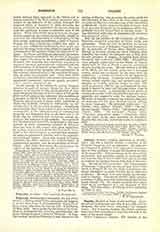

Fabyan, ROBERT, English chronicler, d. February 28, 1513. He was a London clothier, a member of the Drapers’ Company, and an alderman. He held several responsible positions, but resigned his aldermanship in 1502, probably to escape the financial burdens of the mayoralty. Fabyan belongs to the class of City chroniclers, men interested mainly in municipal life, but he is the first to take a wider view and to attempt to combine his London history with that of the country. He was not very successful. His “Concordance of Histories” begins with Brutus and goes down to the death of Richard III, but his effort to harmonize different chroniclers is made without art or historical judgment. The work is of value mainly for its reference to London. The second edition (1533) contains a number of pithy scattered notes on municipal history under Henry VII. Dr. Busch considers that these must be an abridgement of a lost chronicle of that reign. The best edition of Fabyan is that published by Ellis in 1811.
F. F. URQUHART

